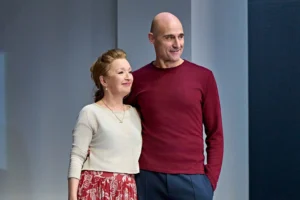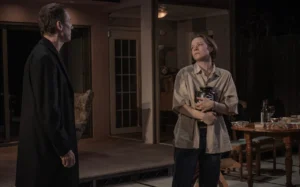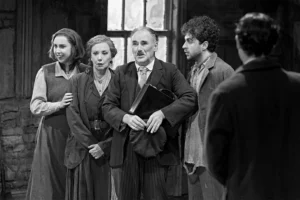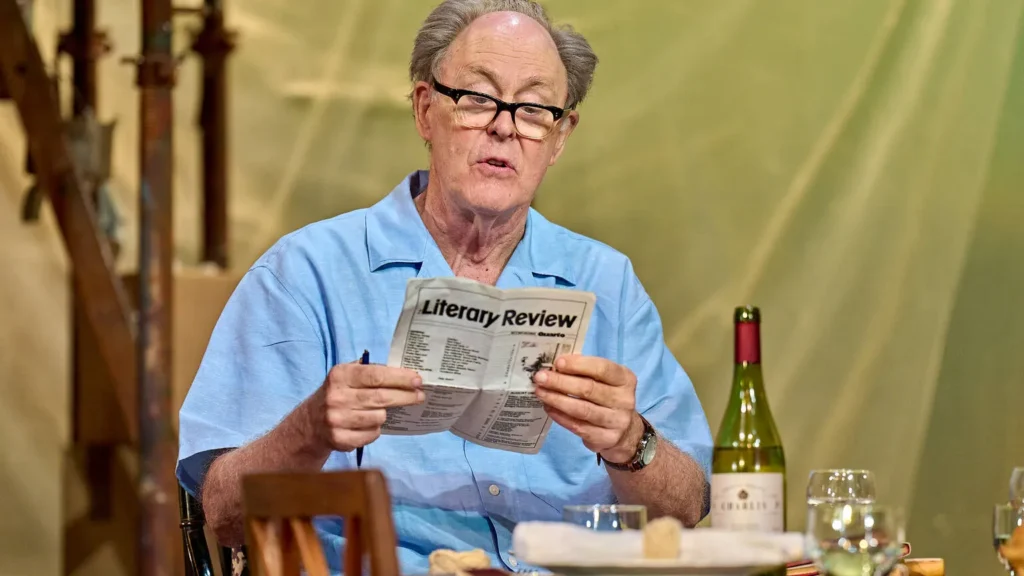Donmar Warehouse

Based on the true story of an innocent man who spent 22 years on death row, The Fear of 13 stars Oscar-winning Hollywood star Adrien Brody. The actor was highly praised by reviewers, and there were laudits too for Miriam Buether’s set which turned the Donmar auditorium into the round and immersed some of the audience in the action. Some critics found the play itself by Lindsey Ferrentino a little flat.
[Links to full reviews are included but a number are behind paywalls and therefore may not be accessible]
Clive Davis in The Times (5★) said, ‘Brody delivers an intense, soul-baring performance in his London stage debut.’ Fiona Mountford in the i (5★) concurred, ‘This is an actor at the top of his game and it is a privilege to watch him up close in this space as we reflect upon the ultimate fairness, or otherwise, of justice.’
Matt Wolf in London Theatre (5★) found, ‘Brody is the real deal – a simmering, soulful theatre animal’. He ended, ‘I surely wasn’t the only one who watched the curtain call misty-eyed at the restoration of justice and in awe of Brody’s impassioned commitment to this story of snatching victory from the jaws of psychic defeat.’
Claire Allfree in the Telegraph (5★) noted, ‘(Brody) combines a bewildered, swaggering, teenage vulnerability with a growing gnawing despair … His consummate performance has the audience on side every step of the way.’
Helen Hawkins at The Arts Desk (5★) said of Brody, ‘His face, with its characterful eyebrows, was built for pathos, his rangey physique to embody suffering; but here his features can also radiate a sunny kind of joy as Yarris discovers love, and that freedom means the freedom to love’.
Alex Wood at What’s On Stage (5★) was impressed that ‘under the creative eye of director Justin Martin and designer Miriam Buether, the auditorium is transformed into the round – generating an oppressive, claustrophobic sense of confined space that is disarmingly flexible when required.’
The Observer‘s Susannah Clapp (4★) also praised the production: ‘Miriam Buether’s design – a bare space for jail and a cosy house trapped behind a glass screen – punches home the distance between inmates and the outside world: like two hands on a prison visit unable to touch.’
Sarah Hemming in the Financial Times (4★) praised Brody, ‘He’s charismatic, funny and a born storyteller, but Brody also finds a more ambivalent, reckless streak that suggests the damage within. It’s a spellbinding performance’.
Andrzej Lukowski in Time Out (4★) commented, ‘It is, above all, a cracking piece of storytelling, that exists because Yarris is a fascinating man who has lived a remarkable life, and because Brody has the tortured oddball charisma to bring that to the stage.’
Arifa Akbar in The Guardian (3★) thought Adrien Brody ‘is a beguiling presence here but is not given enough space to flex his actorly muscles. Action takes the place of atmosphere.’ Nick Curtis in the Standard (3★) called him ‘Tousled, impossibly lean and charmingly wolfish, Brody surfs each twist and turn of a script that is mostly preoccupied with the stories we tell ourselves as individuals or as a society.’
Alice Saville in The Independent (3★) described how ‘the profound bleakness underlying this story is constantly kept at bay with jokes, soul singing, and the bustling of guards and prisoners coming and going on its busy stage. It’s engrossing and poignant, even if it’s afraid to let the dark in.’ Sam Marlowe in The Stage (3★) was muted: ‘Brody is mesmerising’ she said but ‘it’s a straightforward retelling without much subtext or theatrical texture.’
Critics’ Average Rating 4.2★
The Fear of 13 can be seen at The Donmar Warehouse Theatre until 30 November 2024. Buy tickets directly here
If you’ve seen The Fear of 13 at the Donmar, please add your review and rating below









